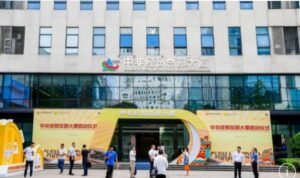* China’s Hunan has a new Sino-African landmark: the China-Africa Economic and Trade Headquarters Building, which is designed to host and support Chinese and African firms engaging in bilateral trade and investment.
* It is the latest effort China has made to spur the private sector’s cooperation with Africa.
* With heavy participation of private companies, China-Africa cooperation has diversified from infrastructure, mining and agriculture to logistics, digital economy, clean energy, finance and others.
CHANGSHA, (Xinhua)/Flowerbudnews: — For Taiwan-based China Communications Media Group, a crucial step in their venture into Africa starts a little closer to home, in Hunan, a central province on the Chinese mainland.
Aspiring to expand its sales network of electric vehicles into Africa, the company will first set up a subsidiary inside the China-Africa Economic and Trade Headquarters Building in Hunan’s provincial capital Changsha, leveraging the many preferential policies and constellation of Chinese and African companies at the site.
“We’ve long wished to explore the African market, but our journey had been circuitous,” said the company’s chairman Liu Yao-yuan. “Now many like-minded companies gather here. I believe our exchanges and cooperation can lead to common prosperity.”

Opened on June 13, the building is the latest Sino-African landmark in Hunan, one of the most active Chinese provinces in economic ties with Africa and a trailblazer in China-Africa cooperation.
Spanning over 100,000 square meters, the building is designed to host Chinese and African firms engaging in bilateral trade and investment, and provide them with subsidies and a range of services from policy consultation to financial support.
Since its launch, more than 30 companies and associations in the fields of engineering, technology and research, telecommunication and others have settled in the building, whose trade with Africa is projected to reach 30 billion yuan (4.2 billion U.S. dollars) over the next three years.

The Mali Business Center, among the building’s first occupants, was set up with an aim of serving Mali companies in China and helping Chinese firms make investment in the West African country.
“We hope to become a home for the numerous Mali companies operating in China and help them explore the Chinese market,” said the center’s director Khalifa A. Sy Diop.
Guangdong-based Africa-China Association for Cooperation, Development and Investment (ACACDI) also plans to register a company at the Changsha headquarters, which promises rent exemption, subsidies and other support.
“Hunan is famous for leading China’s cooperation with Africa,” said Abdualla Elfrid, vice chairman of ACACDI. “And we believe the building will become a bridge for deepening exchanges, enhancing understanding, and expanding cooperation between China and Africa.”
China has remained Africa’s largest trading partner for 15 consecutive years, with bilateral trade reaching a record 282.1 billion U.S. dollars in 2023, according to the Ministry of Commerce.
While Chinese investments in Africa are often represented by large state-owned enterprises building railways, ports and power stations in Africa, smaller private companies are increasingly credited with boosting trade, creating jobs and channeling technology and investments into diverse sectors.

With heavy participation of private companies, China-Africa cooperation has diversified from infrastructure, mining and agriculture to logistics, digital economy, clean energy, finance and others, said Xu Xiangping, head of the China-Africa Economic and Trade Promotion Council.
“These companies are bringing technologies and knowhow into Africa, especially in renewable energy, agriculture and digitalization, which is beneficial to Africa’s modernization,” Xu said.
In recent years, China has put various mechanisms in place to spur private cooperation with Africa, including China-Africa Economic and Trade Expo and China (Hunan) Pilot Free Trade Zone. Hunan often hosts such pioneering policies with its strength in agricultural technology, equipment manufacturing and infrastructure construction.
Shen Yumou, who heads Hunan’s department of commerce, said the building would encourage more small and medium-sized Chinese companies to invest in Africa by pooling together resources and by providing channels and localization services.
“Micro, small and medium-sized companies are more concerned about the costs and risks involved in their journey to Africa, so our goal is to create a safer and more efficient ecosystem for them,” he said.

Meanwhile, the building is expected to guide more African companies into China to tap into the sprawling market of the world’s second-largest economy.
Thanks to expeditious government handling of Africa-related services and its proximity to the manufacturing powerhouse of Guangdong, Hunan has become an ideal springboard for African companies hoping to enter China, said Luo Qin, general manager of Changsha Starlink Foreign Enterprise Comprehensive Services Co., Ltd.
“Many African companies have set their sights on Hunan and the new headquarters,” said Luo, whose company offers foreign trade services to other companies. “We expect the building to become a leading platform for China-Africa trade in the near future.”
(Video reporters: Dai Bin; Video editors: Zhang Li, Zhu Jianhui, Zhang Nan)











